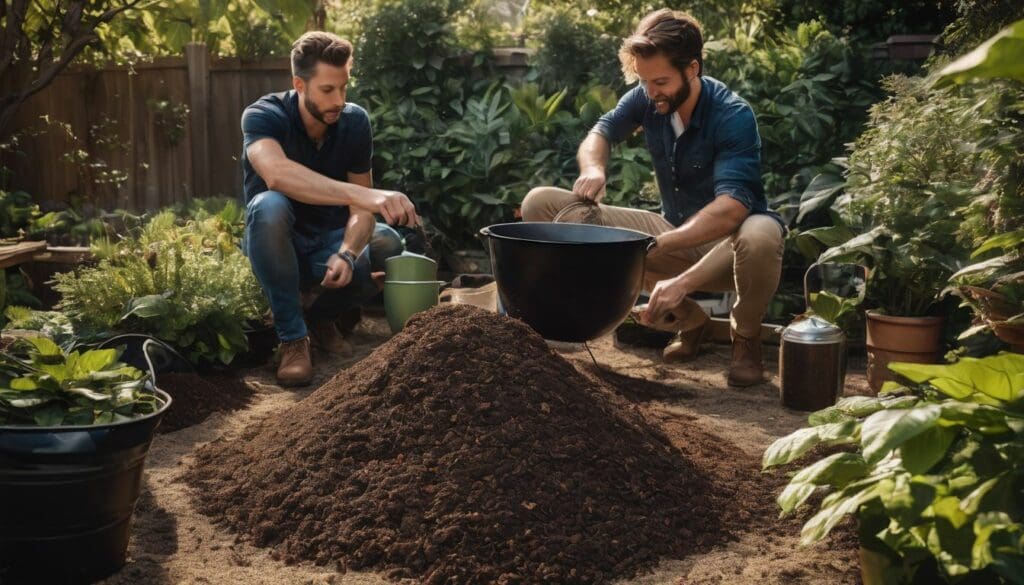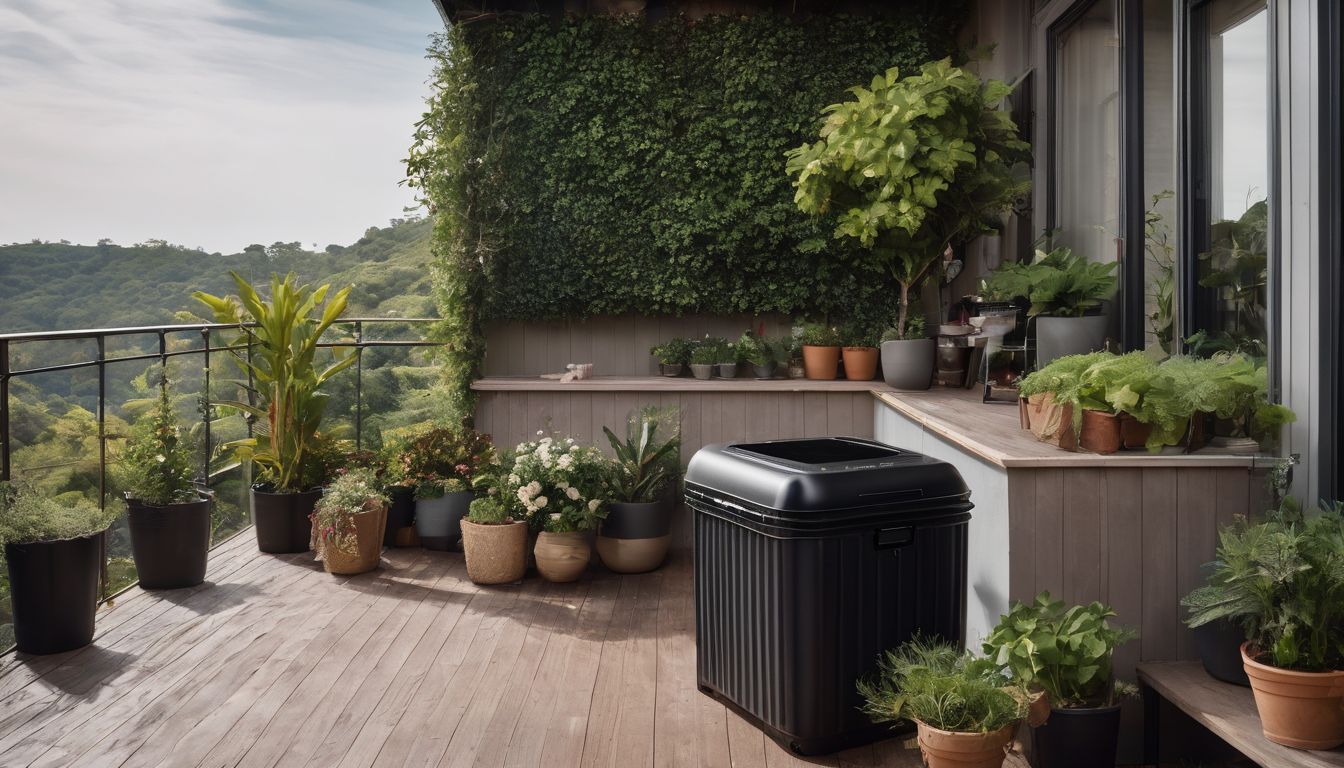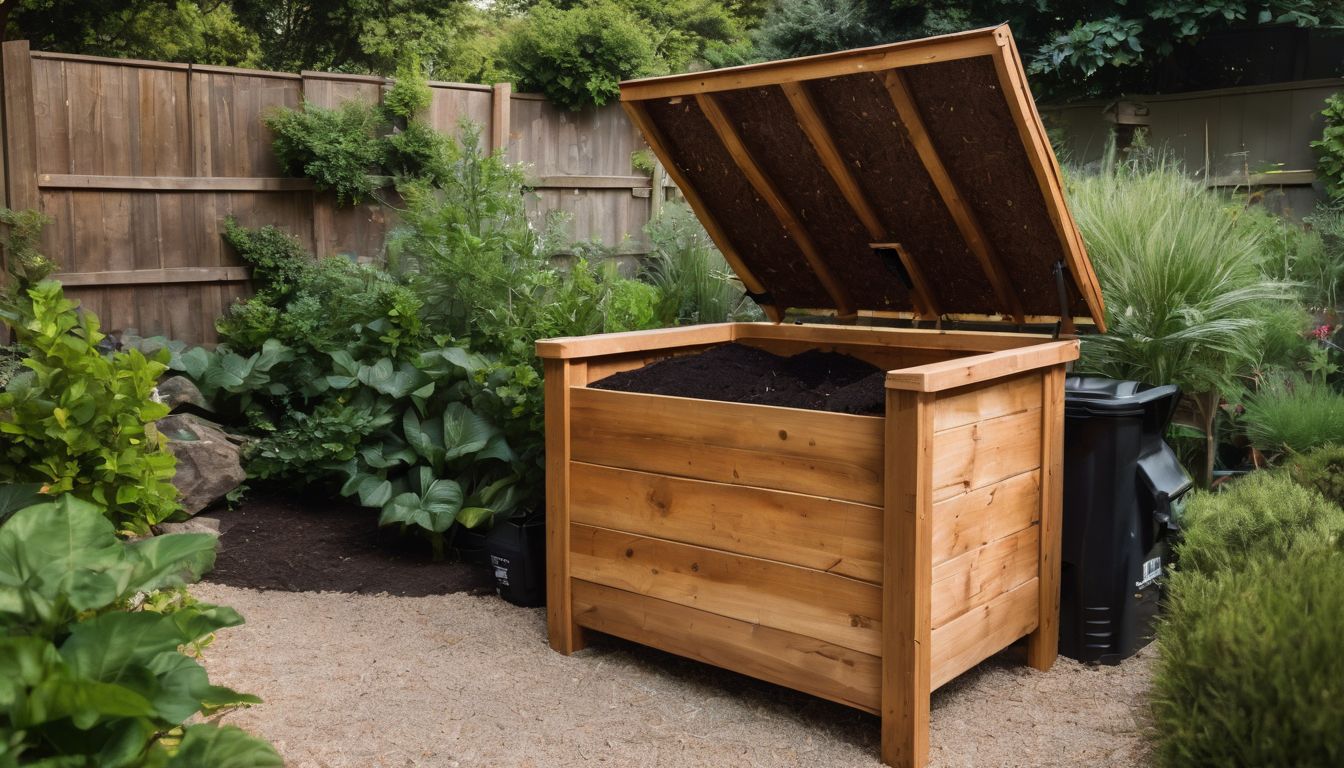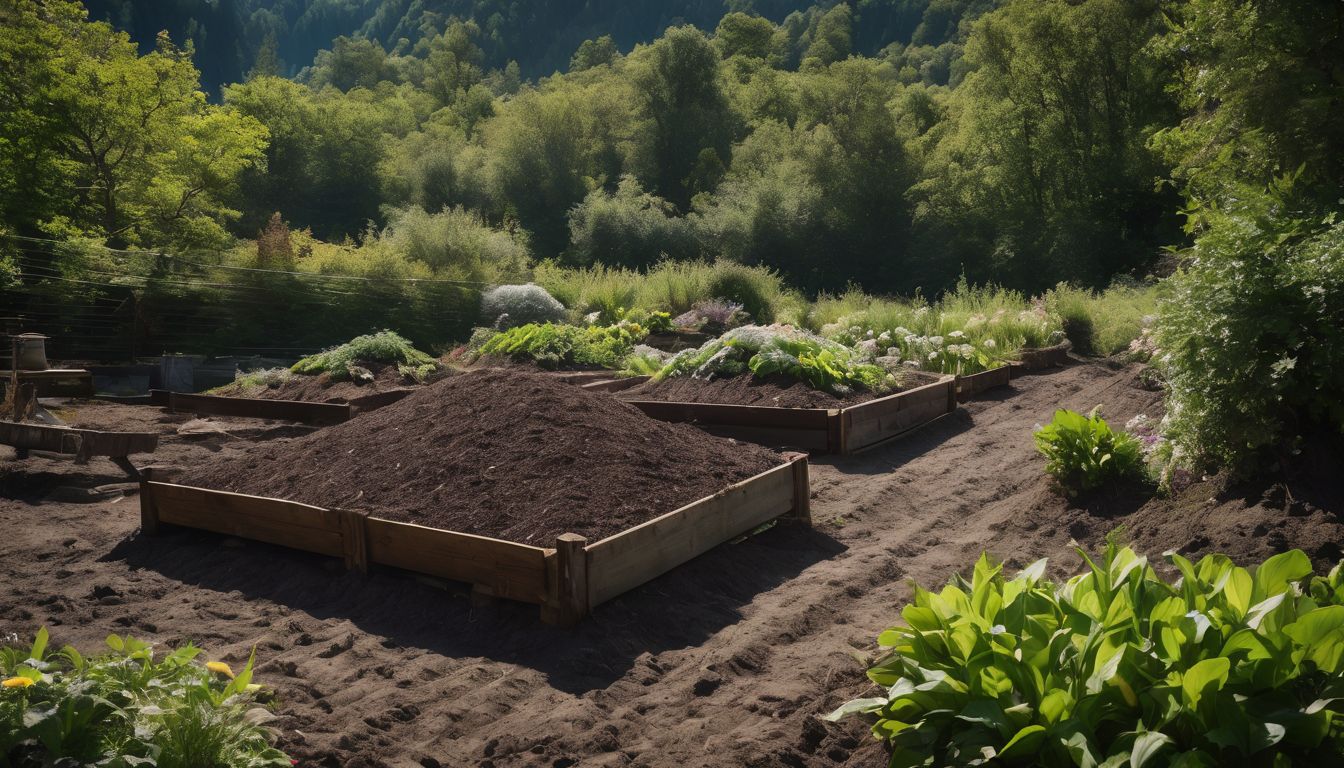Tired of tossing out coffee grounds and tea leaves? Every year, tonnes of these organic leftovers end up in landfills. Our guide unlocks the secret to transforming your morning waste into garden gold, ensuring nothing goes to waste.
Dive in for a greener tomorrow!
Key Takeaways
- Coffee grounds and tea leaves add nitrogen to the compost, aiding in creating a nutrient – rich soil conditioner that boosts plant growth.
- Used directly in garden soil, coffee grounds improve drainage and structure while tea leaves act as a mulch enriching the soil with minerals.
- Spreading coffee grounds around plants helps repel pests like slugs and snails, offering a natural alternative to chemical pesticides.
- Store used coffee grounds and dry tea leaves properly before adding them to compost to prevent mold growth and preserve nutrients.
- Beyond gardening, repurpose coffee grounds for home odour neutralisation, eco-friendly cleaning tasks, and natural beauty treatments.
Benefits of Using Coffee Grounds and Tea Leaves in the Garden and Compost
Using coffee grounds and tea leaves in the garden and compost adds organic matter to the soil, providing essential nutrients for plant growth. They can also help repel pests and improve soil structure, promoting healthy root development.
Adding to compost
Sprinkle used coffee grounds or tea leaves into your compost heap to enrich it with nitrogen. These organic wastes work wonders for creating nutrient-rich soil conditioner that benefits your entire garden.
Make sure you mix them well with other compost materials such as dried leaves, grass clippings, and kitchen scraps to maintain a balanced composition in your compost bin.
Layering these elements correctly accelerates the decomposition process, transforming waste into natural fertiliser far superior to many shop-bought options. Coffee grounds and tea leaves also attract beneficial worms which speed up composting and improve soil structure over time.
Just be aware not to overload the pile solely with these ingredients; balance is key for effective green gardening practices.
Adding directly to soil
Coffee grounds and tea leaves can be added directly to the soil in your garden. Spread a thin layer of coffee grounds around plants or mix them into the top layer of soil. This helps improve drainage, increases organic matter, and adds nutrients like nitrogen to the soil.
Tea leaves can also be sprinkled on the soil surface as a mulch or dug into the top few inches of soil to enrich it with valuable minerals.
Using coffee grounds and tea leaves directly in the garden is an eco-friendly way to recycle waste while benefitting your plants. The natural decomposition process enriches the soil, promoting sustainable gardening practices for environmentally conscious individuals looking to create healthy and vibrant gardens.
Repelling pests
When adding coffee grounds and tea leaves directly to the soil, it can help in repelling pests such as slugs, snails, and ants. These natural pest-repellents contain compounds that insects find unpleasant, deterring them from damaging your plants.
As an environmentally conscious gardener, you benefit from a natural pest control method without the use of harmful chemicals. By incorporating coffee grounds and tea leaves into your gardening practices, you contribute to sustainable agriculture while maintaining a healthy garden ecosystem.
Utilising coffee grounds and tea leaves for repelling pests aligns with eco-friendly gardening practices and supports environmental conservation by reducing the need for synthetic pesticides.
How to Compost Coffee Grounds
To compost coffee grounds, start by collecting and storing used grounds in a container. Then mix them with other compost materials such as kitchen scraps, leaves, and grass clippings to create a nutrient-rich soil amendment for your garden.
Collecting and storing grounds
To collect and store coffee grounds for composting, simply save them after brewing your morning cup. Allow the used grounds to dry out in an open container before transferring them to a sealed storage bin or bag.
When you have enough saved, they can be added directly to the compost pile or mixed with other organic materials. Remember that tea leaves can also be collected by saving used loose leaves or cutting open tea bags.
Storing these materials in a cool, dry place will help retain their beneficial properties until they are ready to be added to your garden or compost.
Mixing with other compost materials
To enrich your compost, mix the coffee grounds and tea leaves with other organic materials. Add them to your compost heap or bin along with kitchen scraps like fruit and vegetable peelings, eggshells, and garden waste such as grass cuttings and leaves.
The combination of these ingredients will create a balanced blend of carbon and nitrogen, essential for successful composting.
This well-balanced mixture will decay naturally to become rich humus that can then be used to improve soil structure, retain moisture, suppress plant diseases, reduce the need for chemical fertilisers, and encourage beneficial microbial activity in the soil.
When added back into the garden or flower beds, it provides plants with essential nutrients for healthy growth.
How to Compost Tea Leaves
– Utilise loose tea leaves directly in the compost pile, ensuring they are spread out to prevent clumping and aiding in faster decomposition.
– Cut open used tea bags before adding them to the compost bin, as most teabags are made of biodegradable materials that can break down over time.
Using loose leaves
Loose tea leaves are a valuable addition to your compost pile or garden soil. They provide essential nutrients like nitrogen, potassium, and phosphorous that enhance soil fertility and plant growth.
To incorporate loose tea leaves into your compost, simply scatter them over the pile and mix in with other organic materials such as kitchen scraps or yard waste. This will help speed up the decomposition process, creating rich, nutrient-dense compost for your garden.
Coffee grounds can also be used directly in your garden to boost soil health. Sprinkling loose coffee grounds around plants can deter pests like slugs and snails while adding organic matter to the soil.
Cutting open tea bags for composting
Cutting open tea bags is a simple way to repurpose used tea leaves for composting. After enjoying your cup of tea, carefully cut open the used teabag and empty the contents into your compost bin.
The tea leaves will decompose over time and add valuable nutrients to your compost, enriching the soil in your garden. By cutting open the teabags, you avoid adding unnecessary waste to landfills and contribute to sustainable gardening practices.
After steeping your tea, remember not to discard the used teabags; instead, snip them open and allow their contents to be part of an eco-friendly solution for enriching garden soil.
Other Uses for Coffee Grounds and Tea Leaves
– Aside from composting, coffee grounds and tea leaves can also be used to neutralise odours in the home, as well as for household cleaning and beauty treatments. These natural waste products have a range of beneficial uses beyond just gardening.
Neutralising odours
Coffee grounds and tea leaves are excellent for neutralising odours in the home. Placing a bowl of coffee grounds in the refrigerator or freezer can effectively absorb unpleasant smells.
Likewise, scattering dried tea leaves at the bottom of rubbish bins can help combat foul odours.
In addition to using them in composting and gardening, repurposing coffee grounds and tea leaves to neutralise odours offers an eco-friendly solution for waste reduction while contributing to greener living practices.
Household cleaning
Coffee grounds and tea leaves are not just beneficial for your garden; they can also be used for eco-friendly household cleaning. The abrasiveness of coffee grounds makes them effective at scrubbing away dirt and grime, while their natural oils help to neutralise odours.
Similarly, the tannic acid in tea leaves can be used to clean glass surfaces and remove grease from kitchen utensils. By reusing these waste products, you can reduce your environmental impact and contribute to sustainable living practices.
Applying coffee grounds and tea leaves to household cleaning is a simple yet effective way to repurpose waste while harnessing their natural properties. This sustainable approach aligns with environmentally conscious lifestyles that seek innovative ways to minimise waste and maximise utility – all whilst contributing towards healthier ecosystems.
Beauty treatments
Enhance your beauty regime with eco-friendly alternatives by incorporating used coffee grounds and tea leaves. Rejuvenate your skin by exfoliating with coffee grounds, leaving it smooth and radiant while reducing waste.
Boost hair health by mixing tea leaves with conditioner for added shine and strength, creating sustainable beauty solutions without compromising the environment.
Revitalise your skincare routine using recycled coffee grounds and tea leaves to reduce waste while enjoying natural, cost-effective beauty treatments. Treat yourself to a DIY spa day with these simple yet effective environmentally friendly options that promote sustainability in personal care practices.
Gardeners’ Frequently Asked Questions
Which plants benefit from coffee grounds and tea leaves? Can synthetic tea bags be composted? Are there any downsides to using coffee grounds and tea leaves in compost?
Discover the answers to these questions and more as we explore the benefits of composting coffee grounds and tea leaves in your garden.
Which plants benefit from coffee grounds and tea leaves?
Coffee grounds and tea leaves are beneficial for acid-loving plants such as roses, azaleas, rhododendrons, blueberries, and camellias. These plants thrive in acidic soil and can benefit from the acidity provided by coffee grounds and tea leaves.
Additionally, these organic materials also contain essential nutrients like nitrogen, potassium, and phosphorus that promote healthy plant growth. When used as a mulch or incorporated into the soil around these plants, coffee grounds and tea leaves can enhance the overall health of the garden while minimising waste.
Moreover, other acid-loving plants like hydrangeas, ferns, holly bushes, and fruit trees may also benefit from the use of coffee grounds and tea leaves in their growing environment.
Can synthetic tea bags be composted?
Synthetic tea bags should be avoided for composting due to their non-biodegradable components. The synthetic materials used in these tea bags do not break down like paper or natural fibers.
Unfortunately, this means that they will not decompose in the compost pile, and may leave behind microplastics as a residue – which can have negative effects on soil health and the environment.
An alternative would be to cut open the synthetic tea bags, empty out the leaves, and then discard the bag itself in your regular waste stream. However, it’s important to confirm with your local waste management facilities whether they accept small amounts of this plastic material before disposing of it properly.
Are there any downsides to using coffee grounds and tea leaves in compost?
While coffee grounds and tea leaves offer numerous benefits to compost, there are some potential downsides to consider. Both coffee grounds and tea leaves are acidic, which can be harmful if used excessively as it may alter the pH balance of the soil.
Additionally, when not properly managed in the compost pile, they may attract pests such as rodents and insects. It’s important to use coffee grounds and tea leaves in moderation and ensure they are well mixed with other compost materials to avoid these issues.
Furthermore, using only coffee grounds or tea leaves in compost can create a dense material that doesn’t allow for proper airflow, leading to anaerobic conditions which produce foul-smelling odors.
Conclusion
Composting coffee grounds and tea leaves benefits the environment and your garden. Utilise them in compost or directly in the soil for nutrient-rich results. Don’t forget their potential to repel pests naturally.
Explore other creative uses, from neutralising odours to household cleaning, and embrace eco-friendly living with these simple practices.
FAQs
1. Can I add coffee grounds and tea leaves to my garden compost?
Absolutely! Composting coffee grounds and tea leaves is a fantastic eco-friendly gardening practice that enriches your soil.
2. What are the benefits of using coffee and tea in my garden?
When you reuse coffee grounds and tea leaves in your garden, they help with soil enrichment, provide pest control, and contribute to recycling organic waste.
3. How do I compost coffee grounds and tea leaves correctly?
To compost them properly, simply spread the used coffee grounds or tea leaves into your compost heap along with other green living waste for balanced decomposition.
4. Are there eco-friendly ways to dispose of my used coffee and tea?
Yes, reusing coffee grounds and utilising leftover tea as part of sustainable practices turns this kitchen waste into valuable nutrients for your plants instead of landfill fodder.
5. Do recycled coffee grounds or reused teas have any negative effects on plants?
Not at all; when applied appropriately, recycling these materials helps improve soil structure without harming your plants—just avoid overdoing it!





